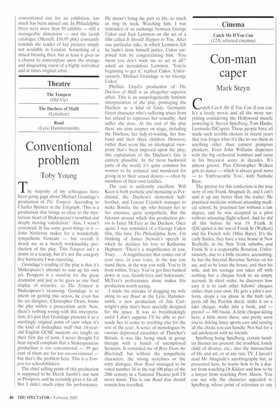Conventional problem
Toby Young
The majority of my colleagues have been going gaga about Michael Grandage's production of The Tempest. According to Charles Spencer in the Telegraph, This is a production that brings us close to the mysterious heart of Shakespeare's troubled and deeply moving valediction.' Alas, I wasn't convinced. It has some good things in it — John Nettleton makes for a wonderfully sympathetic Gonzalo — but overall it struck me as a merely workmanlike production of the play. This Tempest isn't a storm in a teacup, but it's not the category five hurricane I was expecting.
Grandage's reading of the play is that it's Shakespeare's attempt to sum up his own art. Prospero is a stand-in for the great dramatist and just as he gives us one final display of wizardry, so The Tempest is Shakespeare's swansong. Grandage is so intent on getting this across, he even has his set designer, Christopher Oram, frame the play within a proscenium arch. Now, there's nothing wrong with this interpretation, it's just that Grandage presents it as a startlingly original point of view when it's the kind of boilerplate stuff that 14-yearold English GCSE students are taught on their first day of term. I never thought I'd hear myself complain that a Shakespearean production is too conventional — 99 per cent of them are far too unconventional — but that's the problem here. This is a Tempest for schoolchildren.
The chief selling point of this production is supposed to be Derek Jacobi's star turn as Prospero, and he certainly gives it his all. But I didn't much enjoy his performance. He doesn't bring the part to life, so much as ring its neck. Watching him, I was reminded of an exchange between George Cukor and Jack Lemmon on the set of a film called It Should Happen to You. After one particular take, in which Lemmon felt he hadn't done himself justice, Cukor surprised him by congratulating him. 'You mean you don't want me to act at all?' asked an incredulous Lemmon. 'You're beginning to get it,' replied Cukor. Unfortunately, Michael Grandage is no George Cukor.
Phyllida Lloyd's production of The Duchess of Malfi is an altogether superior affair. This is an unapologetically feminist interpretation of the play, portraying the Duchess as a kind of feisty, Germaine Greer character who's suffering arises from her refusal to represses her sexuality. And suffer she does. At the end of the play there are nine corpses on stage, including the Duchess, her lady-in-waiting, her husband and their three children. However, rather than seem like an ideological viewpoint that's been imposed upon the play, this explanation of the Duchess's fate is entirely plausible. In the more backward parts of the world, it's quite common for women to be tortured and murdered for giving in to their sexual desires — often by members of their own families.
The cast is uniformly excellent. Will Keen is both pathetic and menacing as Ferdinand, the Duchess's demented halfbrother, and Lorcan Cranitch manages to make Bosola, the spy who betrays her to her enemies, quite sympathetic. But the fulcrum around which this production pivots is Janet McTeer as the Duchess. Once again. I was reminded of a George Cukor film, this time The Philadelphia Stoty. I'm thinking of James Stewart's speech in which he declares his love to Katharine Hepburn: 'There's a magnificence in you, Tracy ... A magnificence that comes out of your eyes, in your voice, in the way you stand there, in the way you walk. You're lit from within, Tracy. You've got fires banked down in you, hearth-fires and holocausts.' McTeer's performance alone makes this production worth seeing.
I made the mistake of dragging my wife along to see Road at the Lyric Hammersmith, a new production of Jim Cartwright's play that's been specially designed for the space. It was so breathtakingly awful I don't suppose I'll be able to persuade her to come to anything else for the rest of the year. A series of monologues by various depressed casualties of Thatcher's Britain, it was like being stuck in group therapy with a bunch of unemployed Scousers. it reminded me of Boys From the Blackstuff, but without the sympathetic characters, the strong storylines or the witty dialogue. How Road managed to be voted number 36 in the top 100 plays of the 20th century in a National Theatre poll I'll never know. This is one Road that should remain less travelled.


























































 Previous page
Previous page